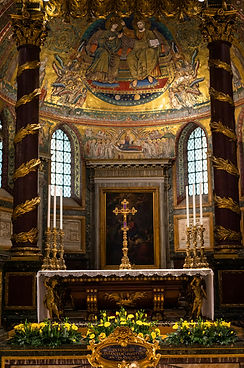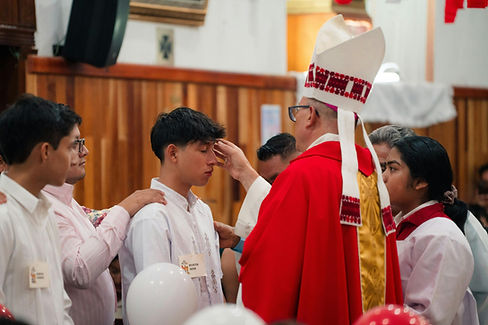



SACRAMENTS
WHAT ARE THE HOLY SACRAMENTS?
The Sacraments are holy rites of divine origin, established by Jesus Christ, that reveal and bestow his grace. In the Catholic Church there are several sacraments that bring our humanity closer to the salvation of Christ (please select for more information):


Baptism
Baptism is the first sacrament of Christian initiation. Through Baptism we are freed from original sin, we become adopted sons and daughters of God and are embraced into the family of the Church. Before starting his public ministry, Jesus was baptized by Saint John the Baptist.
Parents who wish to have their children baptized or Adults who are to be confirmed into the church please contact:

Holy Communion
The Holy Eucharist, which is the Body and Blood of Jesus Christ, brings about our intimate union with him because it represents the love and passion of our risen Lord, ever present in communion and tabernacle. This is the next step on our faith journey, after Baptism, as children of God.
For those receiving their First Holy Communion please contact:

Confirmation
For many of our young people, especially those in secondary school and collage, Confirmation is the next step after Holy communion. This rite is often celebrated with the Bishop. Just like the disciples, we are called to be witnesses of Christ, spreading his gospel and doing all good works in his name.
Blessed by the Holy Spirit, we receive the gift of wisdom, courage, piety and fear of the Lord. This sacrament also gives us the opportunity to profess of our faith in front God, his church and the community.
For those wishing to be Confirmed please contact:

Matrimony
Matrimony, often referred to as marriage, is a sacred sacrament between Man and Women, instituted by God for the purpose of procreation and raising children in the faith.
This union also represents the holy trinity and the love of God has for his people. This is especially evident when Jesus' first miracle was performed at the wedding Cana, "He turned water into wine" (John 2: 1-11), at the request of his mother, our Lady, the Blessed Virgin Mary.
If you are seeking to be married at our parish, please contact:

Anointing of the Sick
With this sacrament there is hope, If it be God's will, someone who is suffering physically may be healed. At the same time we as Catholics understand that through suffering, we are also brought closer to God and with this sacrament, we are spiritually healed and comforted. "Go, your faith has healed you" (Mark 10:52)
Christ himself underwent suffering and death for our sake. And by rising from the dead, he conquered death and sin. Very often illness provokes a search for God and a return to him - CCC 1501.
For more information on how to receive Anointing, please contact:

Reconciliation
Also known as the sacrament of confession, where we come to God in repentance for our sins. Through the Priest, God absolves us from mortal sin, so that we may return to his grace.
As shown with the other sacraments, a personal relationship with God is is very important. Sin is what separates us from that relationship and most often it is what distracts from our faith. Without confession, sin becomes a burden and a wound on our side. Confession is the only way to relieve us from that burden and heal us, spiritually and mentally, from that wound.
To receive this sacrament please refer to the Mass Times (HOME MENU) and attend the Mass of Reconciliation.

Holy Orders
Jesus showed himself to his apostles. He breathed on them, and said to them: ‘Receive the Holy Spirit. If you forgive the sins of any, they are forgiven; if you retain the sins of any, they are retained’ (John 20:19, 22-23).
There are three orders of the Sacrament of Holy Orders namely: Episcopate (Bishop), Presbyterate (Priest) and Diaconate (Deacon). Only practising Catholic men, who are not married, may fulfil the duties required in these orders of the Sacrament.
Deacons perform Baptisms, preach, lead wedding and funeral services, and focus on pastoral care and charitable works. Priests, in addition to the duties of deacons, celebrate Mass, hear Confession, anoint the sick, and may confer Confirmation if delegated by a bishop, while overseeing parish care. Bishops, as successors of the apostles, possess the fullness of Holy Orders, enabling them to celebrate all seven sacraments, ordain priests and deacons, and confer Confirmation as leaders of their diocese.
Is God calling you for a life of service? Please see Parish Priest or Deacon after mass. For more information visit:
Vocations to the Priesthood on www.dioceseofbrentwood.net/